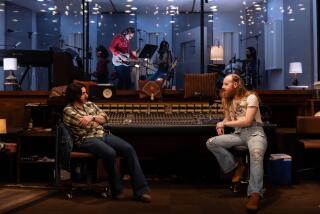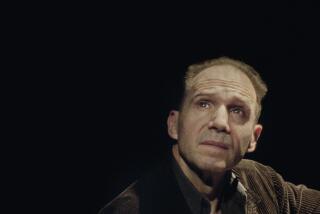Review: Lifeâs clock is wondrously reset in âTime and the Conwaysâ
This review has been corrected. See below for details.
SAN DIEGO -- Social commentary, familial relationships and quantum theory collide in âTime and the Conwaysâ at the Old Globe, and the results are as formidable as they are engrossing.
If any doubts remained that J.B. Priestley was one of the most insightful British dramatists of the 20th century, this translucent revival of his multilayered 1937 look at one well-heeled Yorkshire family between the wars should set them to rest.
Priestley, perhaps best known for âAn Inspector Callsâ and âDangerous Corner,â was a proponent of J.W. Dunneâs theory that past, present and future exist simultaneously. That notion figures into much of Priestleyâs writing and certainly permeates âConways.â
CRITICSâ PICKS: What to watch, where to go, what to eat
It opens in 1919, where would-be novelist Kay Conway (the wonderful Amanda Quaid) celebrates her 21st birthday by pulling family and friends into elaborate charades for the guests assembled offstage. Throughout Act 1, Priestley evokes a vintage drawing-room ethos, as the Conways and certain key guests are introduced amid brittle, witty exposition that anticipates the original âUpstairs, Downstairs,â not to mention âDownton Abbey.â
But as Act 1 draws to a close, young Carol Conway (Leanne Agmon, avoiding ingĂŠnue traps) takes a nap on the downstage left chaise, designer Neil Patelâs elegant set slides upstage, and âTimeâ leaps concurrently forward to 1937.
Thanks to what Priestley previously embedded, the wholly changed situation of Act 2 carries an extra patina of meaning, here poignant, there chilling, closing with a hair-raising throwaway coup between stuttering Alan Conway (Jonathan Fielding, precise and touching) in one era and Carol in the other.
And when Act 3 segues back to 1919, picking up where things left off, the now-revealed consequences of each characterâs actions and choices achieve near-metaphysical levels, with a breathtaking final image.
Rebecca Taichman may be the ideal director for this property, gleaning metaphoric levels of stagecraft from a sharp design team â David Israel Reynosoâs detailed costumes, Scott Zielinkskiâs ambient lighting and Matt Hubbsâ elegiac sound are of a seamless piece with Patelâs brilliant work â and heightened naturalistic acting from a strikingly capable cast.
PHOTOS: The most fascinating arts stories of 2013
Besides Quaid, Fielding and Agmon, Rose Hemingwayâs coquette Hazel and Morgan Hallettâs socialist Madge bring considerable nuance to their contrasting sisters, and Lee Aaron Rosen digs deep beneath favorite son Robinâs bonhomie.
As their manipulative widowed mother, Kim Martin-Cotten channels Penelope Keith and Catherine OâHara at once. Leo Marks, vivid as ever, an assured Sarah Manton and the imposing Max Gordon Moore as the three outsiders complete a most accomplished roster.
Despite some fleeting oddities of tempo and accent â at the reviewed performance, a sense of over-attenuation was occasionally detectable â the net effect feels incisive, fascinating and definitive. Itâs a remarkable reading of a neglected masterpiece, and audiences may find these âConwaysâ haunting their psyches for some time thereafter.
âTime and the Conways,â Old Globe, 1363 Old Globe Way, San Diego. 7 p.m. Tuesdays and Wednesdays, 8 p.m. Thursdays and Fridays, 2 and 8 p.m. Saturdays, 2 and 7 p.m. Sundays. Also, 2 p.m. April 23. $29 and up. (619) 234-5623 or www.TheOldGlobe.org. Running time: 2 hours, 25 minutes.
For the record: April 24, 10:25: Kim Martin-Cottenâs name was mispelled as Martin-Cotton in an earlier version of this review.
More to Read
The biggest entertainment stories
Get our big stories about Hollywood, film, television, music, arts, culture and more right in your inbox as soon as they publish.
You may occasionally receive promotional content from the Los Angeles Times.










